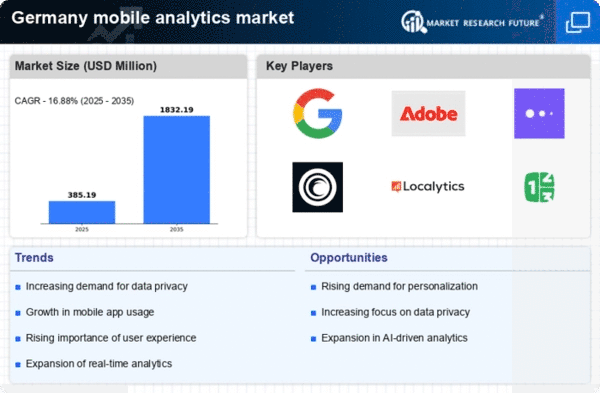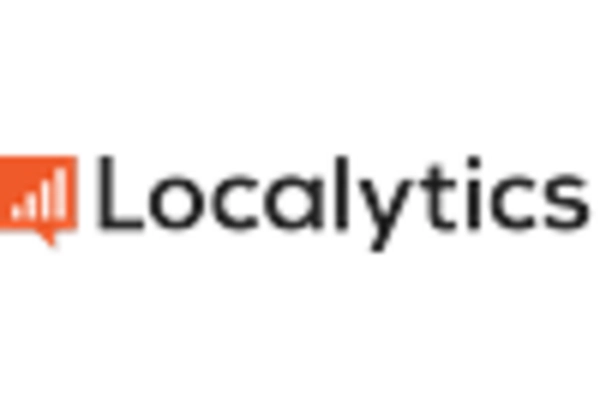Evolving Consumer Behavior
In Germany, consumer behavior is rapidly evolving, with a marked shift towards mobile-centric interactions. This trend is reflected in the increasing time spent on mobile applications, which has risen by 30% over the past year. As consumers become more reliant on mobile platforms for shopping, entertainment, and communication, the mobile analytics market is witnessing heightened interest from businesses aiming to understand these behavioral changes. Companies are leveraging analytics to tailor their offerings, optimize user experiences, and enhance customer satisfaction. The ability to track and analyze user interactions in real-time allows businesses to make data-driven decisions, thereby fostering a competitive edge in the market. This evolving consumer landscape is likely to continue influencing the growth trajectory of the mobile analytics market.
Rising Mobile Device Penetration
The mobile analytics market in Germany is experiencing a notable surge due to the increasing penetration of mobile devices. As of 2025, approximately 85% of the German population owns a smartphone, which significantly enhances the volume of data generated through mobile applications. This proliferation of mobile devices creates a fertile ground for analytics solutions, as businesses seek to harness user data for improved decision-making. The mobile analytics market is thus poised for growth, as companies invest in tools that can analyze user behavior, preferences, and engagement metrics. Furthermore, the rise in mobile internet usage, which stands at around 90%, indicates a shift towards mobile-first strategies among businesses, further driving the demand for mobile analytics solutions.
Investment in Digital Transformation
The ongoing digital transformation across various sectors in Germany is significantly impacting the mobile analytics market. Organizations are increasingly recognizing the value of data-driven insights, leading to a surge in investments in analytics technologies. In 2025, it is estimated that spending on digital transformation initiatives will reach €100 billion, with a substantial portion allocated to mobile analytics solutions. This investment trend indicates a strong commitment to leveraging data for strategic decision-making and operational efficiency. As businesses seek to enhance their digital capabilities, the mobile analytics market stands to benefit from the demand for sophisticated analytics tools that can provide actionable insights. The integration of mobile analytics into broader digital strategies is likely to become a key focus for organizations aiming to remain competitive.
Regulatory Compliance and Data Governance
In Germany, the emphasis on regulatory compliance and data governance is shaping the mobile analytics market. With stringent data protection laws, such as the General Data Protection Regulation (GDPR), businesses are compelled to adopt analytics solutions that prioritize data privacy and security. This regulatory landscape creates both challenges and opportunities for the mobile analytics market. Companies are increasingly seeking analytics tools that not only provide insights but also ensure compliance with legal requirements. As a result, there is a growing demand for solutions that incorporate robust data governance frameworks, enabling organizations to manage user data responsibly. This focus on compliance is likely to drive innovation within the mobile analytics market, as providers develop features that align with regulatory standards.
Emergence of Advanced Analytics Techniques
The mobile analytics market in Germany is witnessing the emergence of advanced analytics techniques, such as predictive and prescriptive analytics. These methodologies enable businesses to go beyond traditional descriptive analytics, allowing for deeper insights into user behavior and trends. As organizations strive to enhance their competitive advantage, the adoption of these advanced techniques is becoming increasingly prevalent. In 2025, it is projected that the market for predictive analytics in Germany will grow by 25%, reflecting a shift towards more sophisticated analytical capabilities. The mobile analytics market is thus likely to benefit from this trend, as companies seek to implement solutions that can forecast future behaviors and optimize marketing strategies accordingly. This evolution in analytics capabilities may redefine how businesses approach mobile user engagement.
















